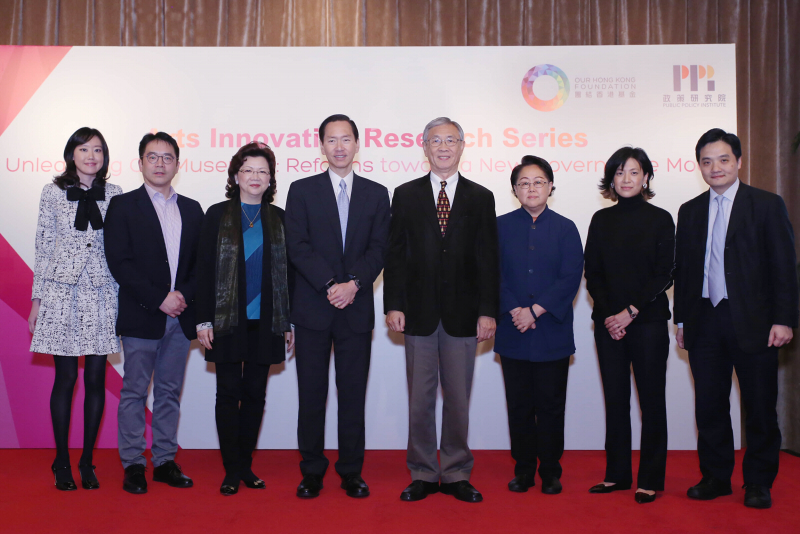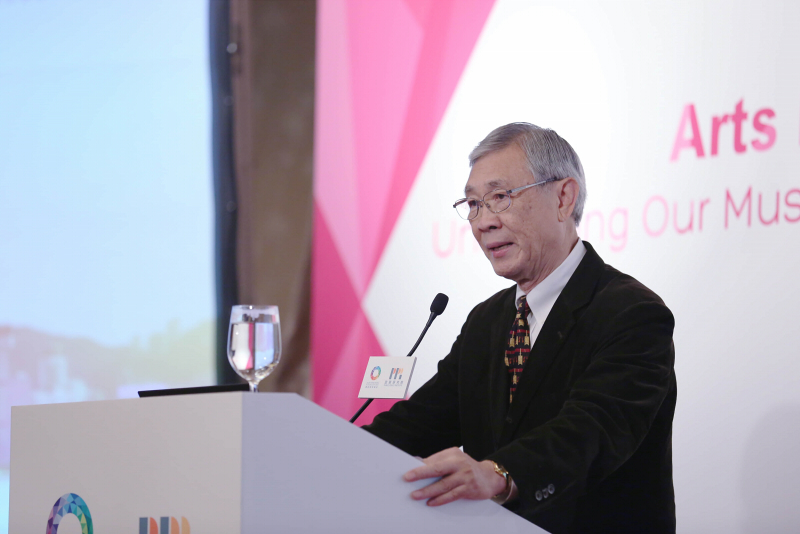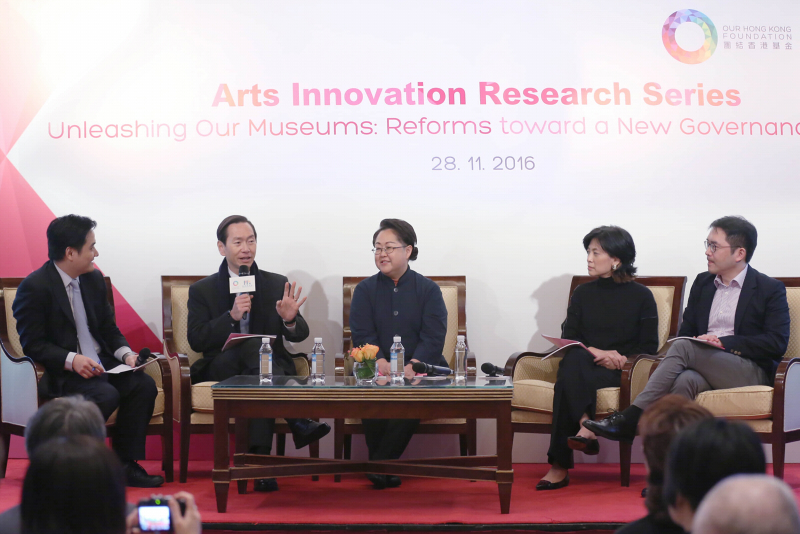Our Hong Kong Foundation “Arts Innovation” Research Series
“Unleashing our Museums: Toward a New Governance Model”

Following the publication of research reports on “Science and Tech Innovation” and “Social Innovation,” Our Hong Kong Foundation (OHKF) launches the “Arts Innovation” research series today with a first report on the topic of “Unleashing Our Museums: Reforms toward a New Governance Model”. The research report argues that the full potential of Hong Kong’s museums can only be unleashed under a publicly funded, autonomously managed governance model. This would be an improvement from the status quo, where the majority of public museums are managed as a government department. Instead, the report proposes that legislation be enacted to establish a statutory Museums Board. The new governance model would enliven the museums scene and increase Hong Kong’s competitiveness as a cultural hub.
Mrs. Eva Cheng, Executive Director of OHKF said, “It is our honor to have Professor Hsin-kang Chang, former President of the City University of Hong Kong, Professor Wing Wah Chan, Deputy Director of the Hong Kong School of Professional and Continuing Education of The University of Hong Kong, and Mr David Chun-Yee Pong, member of the M+ museum board, lead the OHKF Task Force on Arts Innovation. We believe that arts and culture can instill new energy into Hong Kong’s economic development while promoting harmony in society.”
Mrs. Cheng also commented, “Arts and culture is key to what makes cities attractive, prosperous and open. It is through the arts that citizens have an opportunity to enjoy beauty, creativity and artistic endeavor. According to the Census and Statistics Department, the cultural and creative industries in Hong Kong doubled its value in the past decade, reaching an impressive total of nearly $100 billion in 2014. Employment in the cultural and creative industries also accounted for 5.7% of total employment in Hong Kong in 2014. Most importantly, arts and culture can foster exchange between cities and between countries, enhancing understanding in society.”
OHKF is holding a symposium today to explore the future development of arts and culture in the city. Professor Chang said that Hong Kong is situated at the mouth of the Pearl River in the Lingnan region, enjoying an impeccable geographical location. Combined with its historical advantages, Hong Kong is where Chinese and Western cultures meet. Hong Kong should be committed to continuing its role of being a bridge between China and the world. In particular, our museums can be ambassadors for Hong Kong, showcasing our unique culture and heritage, a blend of East and West, to tourists who visit our city, and also on outbound exhibitions around the world.

Professor Chang said “In fact, in 2015, the government is pouring resources into a major extension and renovation for five major museums. In our view, this makes it timely to revisit the issue of museum governance as the government’s investment into the physical infrastructure of our museums sector would only be enhanced and reinforced if accompanied by improvements in the software, or governance model of our museums.”
The research team surveyed some of the most prominent and most visited public museums around the world, revealing an unmistakable trend toward the adoption of a publicly funded, autonomously managed mode of governance, often through legislation and reform. Contrary to overseas practice, museums in Hong Kong are included under the Public Health and Municipal Services Ordinance, where a brief section on museums exists alongside discussion of sewers and drains, public slaughterhouses, cemeteries, libraries and civic centres. This brief section does not provide for the governance model of museums. We recommend that the government enacts a Museums Ordinance to establish the legal status of museums and formulate a professional and suitable governance model.
At the same time, OHKF recommends that the government establishes a statutory, governing Museums Board, and defines the roles and responsibilities of the board members through legislation. The Board should comprise representatives from different sectors, such as artists, and representatives from cultural and business sectors, in order to form a well-composed and representative Board.
The report notes that a new governance model would offer distinct advantages through integration with the broader community, and diversification in sources of museum funding. Currently, the majority of funding for LCSD museums comes from the government. In contrast, under a publicly funded, autonomously managed governance model, museums would be able to attract corporate sponsorship and individual donations, enlarging the entire pie for museum funding. The new governance model would also allow for a departure from the civil service system that enables more openness, diversity and flexibility in human resources.
Mr Bernard Charnwut Chan, the Chairman of the Jockey Club Central Police Station Advisory Committee, commented on the importance of museums, “Museums are among the most important cultural institutions in a city. Not only do they preserve our cultural heritage through collections that vividly present our past lives and memories, they are also an important educational platform that enriches our next generation’s knowledge on history and the world.”
Ms. Ada Wong, member of the Museum Advisory Committee of the LCSD and former member of the West Kowloon Cultural District Museum Advisory Board said, “Many renowned museums in the world have adopted a “publicly funded, autonomously managed” governance model, including Tate Modern in London, Museo del Prado in Madrid and the Rijksmuseum in Amsterdam, etc. These museums have achieved great success. M+ in the West Kowloon Cultural District has also adopted this model. We hope that LCSD museums will also attain greater effectiveness stemming from higher autonomy in their management.”

A vibrant museum sector is indispensable for a world-class city like Hong Kong. OHKF hopes the transformation of the governance model of our public museums would breathe new energy and enliven the entire scene, for the benefit of the general public. Finally, aside from museum governance, the Arts Innovation research series will also cover various topical issues in the cultural and creative industries, encompassing the visual arts, performing arts and popular culture, in an attempt to find new paths for the long-term development of Hong Kong.



